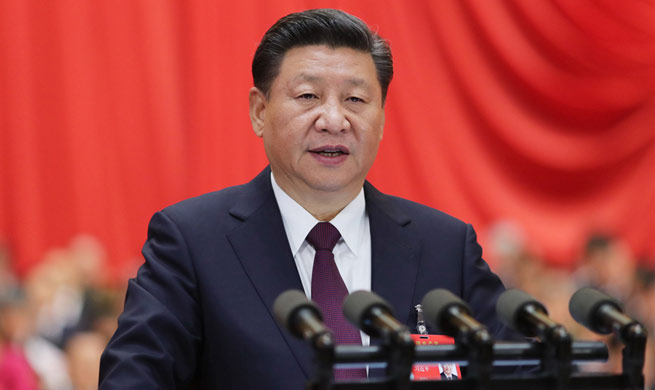By Xinhua writer Chen Wenxian
JERUSALEM, Nov. 17 (Xinhua) -- Israeli start-up companies and state agencies are gearing up with investments in new smart vehicle technologies, in hope of making the country a key player in the looming field of auto-tech industry.
The Israeli government decided to support the emerging industry after identifying the economic potential of it.
In January, the government approved a five-year program to promote smart transportation in Israel. According to a report released in October by the official Israeli Innovation Authority, the program was allocated a designated budget of approximately 65 million U.S. dollars.
Additionally, in early October, Israeli Transportation Minister Israel Katz launched the first national smart and automated transportation test area founded on part of the country's most well-traveled highway.
Moreover, the Fuel Choices and Smart Mobility Initiative of the Prime Minister's Office partnered with the Ministry of Economy and Industry, and Israel Innovation Institute to establish Ecomotion, a non-profit organization that aims at supporting the Israeli auto-tech industry.
Refael Saadon, project manager of Ecomotion, said in an interview with Xinhua, "we focus on connecting the different players in the field, such as researchers, state and municipal institutions, potential global investors, car manufactures and start-ups."
"We are doing so in order to use technology as a way to improve people's quality of life," Saadon added.
A growing number of Israeli start-ups are joining the emerging field. According to the report released in October, some 450 Israeli start-ups, with a total worth of 15.3 billion dollars, are currently working on smart mobility solutions.
Major car manufactures believe that autonomous cars will be on the road by early 2020s. Some of them are looking into Israel-based innovations in the field.
Daimler, Hyundai Motor, Delphi, General Motors, Ford Motor, Volkswagen, BMW and Porsche have already invested or announced future partnerships with Israeli companies.
Valens Automotive, a division of Valens, was founded in order to develop one simple solution for in-vehicle connectivity. Valens Automotive's chip enables in-vehicle connectivity, converging audio and video, Ethernet, USB, controls and power over a single wire. To date, Valens has raised 100 million dollars in funding.
"The focus of our chips is to enable all the applications to work together as smoothly as possible, so there will be an optimal operation of the infotainment part alongside the security and safety part," said Sandra Welfeld, senior marketing executive at Valens.
Valens' technology is designed to simplify the connectivity by using simple cables that includes as much as possible in one connection. By eliminating these cables, fuel can also be saved to a large extent as the car becomes lighter, according to Welfeld.
Ben Volkow, founder and CEO of Otonomo, told Xinhua that data transmission is the basic element of the smart vehicle connectivity. "We take the data that comes out from the car and we provide it to big ecosystems that want this data."
Otonomo aims to give OEMs (car manufacturers) and drivers a way of making use of the massive amount of data generated by cars by creating a marketplace that car ecosystem service providers can tap into, said Volknow.
These data include parameters such as location, number of people in the car, listening habits, seatbelts use, fuel consumption, driving patterns and more, according to Volknow.
While some Israeli start-ups are working hard to develop auto-tech, others have become the targets of Mergers and Acquisitions of large international companies or have already been purchased.
Mobileye, an Israeli start-up developing collision avoidance systems, was bought for 15.3 billion dollars by Intel in March 2017. This was the largest exit in the Israeli high tech industry to-date.
Argus is another Israeli start-up recently acquired by Continental, a billion-dollar German-based automotive manufacturing company. Argus technology protects vehicles from cyber-attack. The company was bought for approximately 400 million dollars and the investment till that point was 26 million dollars.
Daimler, a German-based automotive corporation, has invested over 100 million dollars in Israeli auto-tech start-ups. The investments include a 60 million funding round for StoreDot, an Israeli start-up that develops fast-charging electric car batteries. Daimler has also partnered with the Israeli ride-sharing start-up Via, which will operate ride services across Europe.
The auto giant announced the opening of its research and development center in Israel's Tel Aviv on Nov. 16, which focuses on digital vehicle and mobility services.
Delphi, an automotive global supplier of vehicle technology, is following the footsteps of Daimler in increasing investment in Israeli auto-tech companies. Eran Sandaous, Delphi's vice president, said about the Israeli auto tech market, "There is real activity in the mobility field - unproportional to the country's size. We are interested in that."
In the past six months, Delphi invested 150 million dollars in three Israeli start-ups - 60 million in Valens Automotive and 25 million in Otonomo in April, plus 65 million in Innoviz Technologies in August.
Earlier in November, another global company, Hyundai Motors, announced its plans to set up a development center in Israel, which will open in 2018 and focus on energy, smart cities, artificial intelligence, smart transportation and robotics. Hyundai Motors is becoming the latest major international car maker to set up R&D center in Israel.

















